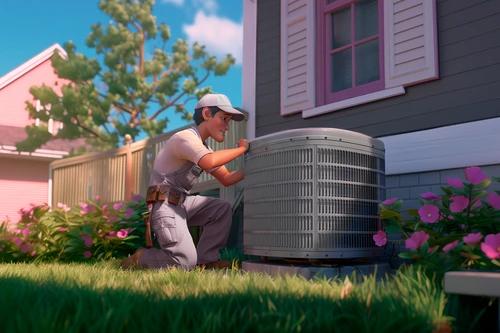What’s the Average Cost to Replace an AC in Florida?

If you live in Florida, you already know how important a reliable air conditioner is, especially when the summer humidity hits full blast. Whether your old system is on its last leg or you’re building a new home, one of the first things you’re probably wondering is: What’s the average cost of a new AC in Florida?
The answer? Well, like most home upgrades, it depends. HVAC.com walks you through the typical price ranges, what affects the final cost, and what you should keep in mind to make the best decision for your home – and your budget.
New AC Unit Costs in Florida
In Florida, for an average-sized home, you’re probably looking at a 3-ton air conditioning system. Here’s a breakdown of what that might cost:
- 3-ton AC + Furnace system: $10,000 to $13,000
- 3-ton Heat Pump + Air Handler: $9,500 to $12,500
- 3-ton AC Condenser + Air Handler: $9,000 to $12,000
These prices include both the equipment and professional installation, which is a big part of the cost. Keep in mind: these are ballpark ranges. Your final price could be a little higher or lower depending on a few key factors.
What Affects the Cost of a New Air Conditioner in Florida?
So why the range? Several things can nudge your price up or down:
1. Brand and Manufacturer
Premium brands often come with higher upfront costs, but they tend to deliver better reliability, longer lifespans, and stronger warranties. Some brands also offer better availability of parts and service technicians in Florida, which can make repairs quicker and easier down the road.
2. SEER2 Rating (Efficiency)
SEER2, or Seasonal Energy Efficiency Ratio 2, measures how efficiently your air conditioner cools your home. Higher SEER2 ratings generally cost more upfront, but they pay off in the long run with lower energy bills — especially in Florida’s year-round heat. The U.S. Department of Energy requires a minimum SEER2 level of 14.3 for states in the South like Florida, so upgrading might be necessary for compliance.
3. Motor Speed
Air conditioners come with single-stage, two-stage, or variable-speed motors. Variable-speed systems are the most expensive but provide precise cooling and greater energy efficiency. In humid Florida climates, variable-speed motors are also better at removing moisture from the air because they run at lower speeds for longer cycles, helping to improve indoor comfort.
4. Size and Cooling Capacity
The size of your air conditioner, measured in tons, is crucial to cooling your home properly. A typical 3-ton AC system is common for mid-sized Florida homes, but larger homes may need bigger units, which raises costs. An incorrectly sized system can make cooling less efficient and drive up your energy bills, so it’s important to have a professional ensure it’s the right size.
5. Labor and Installation Costs
Labor costs can vary depending on your installer’s experience, certifications, and how complex the job is. For example, replacing an old unit with a new one of the same size is simpler than upgrading your ductwork or relocating the system. In Florida, installing an air conditioner during peak seasons can also drive up labor prices due to higher demand.
6. Additional Features and Add-Ons
Optional upgrades like smart thermostats, zoning systems, advanced air filtration, or UV light purifiers can increase the total cost by several hundred dollars or more. However, these features can improve your home’s air quality and give you better control over your comfort, which is a big plus in Florida’s humid environment.
How to Tell If It’s Time to Replace Your Air Conditioner
- Age of Your System: Central air conditioners typically last 15-20 years, and as they age, their efficiency decreases, making replacement inevitable after a certain point.
- Frequent Breakdown Costs: If you’re finding yourself fixing your AC unit more than once or twice a season, the cost of repairs can quickly outweigh the price of replacing the system.
- Higher Energy Bills: As your air conditioner ages, it becomes less energy efficient, driving up your monthly energy costs. If you notice a spike in bills, your AC may be to blame.
- Inconsistent Cooling: When some rooms in your home struggle to maintain the set temperature, it's a sign your air conditioning system might be either too old or not adequately sized for your space.
Don’t Forget About Maintaining Your New Air Conditioner
Once you’ve invested in a new air conditioner, regular maintenance is key to protecting that investment. Scheduling professional tune-ups at least once a year (twice is even better in Florida) helps catch small issues early, keeps your system running efficiently, and extends its lifespan. Plus, it’s a lot cheaper to fix a minor issue during a routine check than to face an emergency repair in the middle of a heatwave.
During a professional tune-up, your technician will thoroughly inspect, clean, and test the system’s components, checking things like refrigerant levels, electrical connections, and airflow to ensure everything is operating safely and efficiently. They can also spot signs of wear and tear early, helping you avoid costly breakdowns and unexpected downtime.
Simple tasks like changing your air filters regularly and keeping outdoor units free of debris can go a long way in keeping your system healthy between visits.
